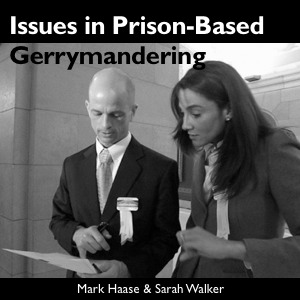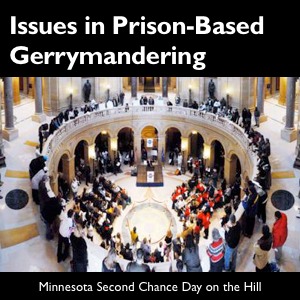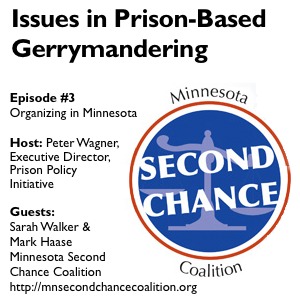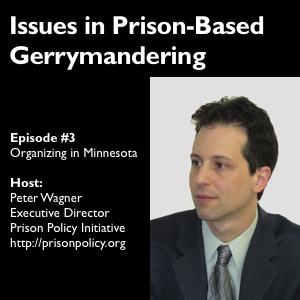“Organizing to end prison-based gerrymandering in Minnesota” — Podcast Episode #3
In this podcast, Peter Wagner speaks with the Minnesota Second Chance Coalition about their campaign to end prison-based gerrymandering in that state.
by Peter Wagner, June 16, 2010
Host: Peter Wagner, Executive Director, Prison Policy Initiative
Guests:
Sarah Walker and Mark Haase of the Minnesota Second Chance Coalition
June, 2010
Transcript:
- Peter Wagner:
-
Welcome to Issues in Prison-Based Gerrymandering, a podcast about keeping the Census Bureau’s prison count from harming our democracy. The Census Bureau counts people in prison as if they were actual residents of their prison cells, even though most state laws say that people in prison are residents of their homes. When prison counts are used to pad legislative districts, the weight of a vote starts to differ. If you live next to a large prison, your vote is worth more than one cast in a district without prisons. Prison-based gerrymandering distorts state legislative districts and has been known to create county legislative districts that contain more prisoners than voters.
On each episode, we’ll talk with different voting rights experts about ways in which state and local governments can change the census and avoid prison-based gerrymandering.

Our guests today are Sarah Walker and Mark Haase of the Minnesota Second Chance Coalition. Welcome Sarah and Mark. - Sarah Walker:
-
Thank you.
- Mark Haase:
-
Thanks Peter, glad to be here.
- Peter Wagner:
-
Can you tell us about the Minnesota Second Chance Coalition?
- Sarah Walker:
-

Sure, the Minnesota Second Chance Coalition started in 2007 after a group of non-profit leaders came together and decided that we needed a lobbying day on justice reform issues to advocate for people with criminal records, and also a way to incorporate their voices because Minnesota, which is highly participatory, has many lobbying days, but there was a glaring omission at the time. We came together and had a lobbying day, and after that first lobbying day in 2008, actually, we realized that we needed a more concerted legislative focus with clear policy goals. From that point we’ve been meeting at least once a month since then to address policy issues, and we support other organizations’ policy agendas and help push other organizations to address justice reform issues. - Mark Haase:
-
I would just add to that that our current membership is over 45 diverse organizations that work on these issues together.
- Sarah Walker:
-
 They range from everything from mental health service providers to peer advocacy organizations to corrections service providers and state agencies. Again it’s just in the acknowledgement of the fact that the justice system has unintentionally touched basically every area of this social service and civic engagement world.
They range from everything from mental health service providers to peer advocacy organizations to corrections service providers and state agencies. Again it’s just in the acknowledgement of the fact that the justice system has unintentionally touched basically every area of this social service and civic engagement world. - Peter Wagner:
-
So I understand that the Minnesota Second Chance Coalition has taken up prison-based gerrymandering as one of its issues. Can you tell our audience a little bit about why, because for some people who know that Minnesota has a relatively small prison population they might be surprised to hear about your work.
- Sarah Walker:
-
Well, yes, I think that prison-based gerrymandering is relevant to an organization looking for fair and responsible policies and practices because it recognizes that the justice system has expanded and in its expansion there have been many unintended consequences. Prison-based gerrymandering is one amongst many. But it’s also about the fact that the justice system is related to civic participation and civil society, and that, increasingly, the justice system is touching on all aspects on civil society. It’s intruding into areas that I think people didn’t anticipate.
- Mark Haase:
-
I would just add to that that by bringing attention to the prison gerrymandering issue, we may engage new policy makers, new constituents, new supporters who approach some of these issues from a different avenue and would be interested in this, and by becoming interested in this issue of their democratic participation they may become more supportive on some of our other issues.
- Sarah Walker:
-
Yeah, and along those lines, one of the reasons the coalition has been effective is because we are very strategic about making sure we have statewide support. Too often, issues of crime and justice are framed in urban, in terms of urban populations, and certainly in Minnesota this is not always the case. Minnesota has one of the smallest prison populations, but it has one of the largest populations on probation and parole. About 40% of the people in prison return to the two major metropolitan cities, but that still leaves 60% of people involved in the justice system coming from greater Minnesota. We also think it’s really important to look at those issues in a much broader way.
- Peter Wagner:
-

So could you tell us a little bit about how your campaign started in Minnesota and what the trajectory was? - Sarah Walker:
-
First the League of Women Voters contacted Mark and said they were interested in this issue. Mark then contacted me and I contacted you because you’re the expert on this subject. And that’s basically how it came to our attention to be on our agenda.
- Mark Haase:
-
We started on the issue a little bit late in our normal policy development process, so we’d already developed a number of other bills that we were looking at moving through the legislative session this year. By the time we decided to work on the prison gerrymandering, got the work with the League of Women Voters, and got the legislative support, found an author, and got the legislation drafted and introduced we were about a month into the legislative session, maybe a little bit more.
- Peter Wagner:
-
You picked up some unexpected support, I understand.
- Mark Haase:
-
That’s correct. Well, I think the League of Women Voters showing an interest in this was somewhat unexpected. They had not engaged directly in criminal justice reform policies before. Their interest in this was a little bit surprising to me especially when nobody, you know, our organizations had approached them about it. So that was an initial surprise, at least on my part. One supporter that we found in our House of Representatives, which is typically takes a pretty “tough on crime” stance on these issues, was one of the most well-known “tough on crime” Democrats. I was talking to her about some of the other issues that we’re working on, some of the other bills, and she saw this issue and she just went, “What? This is crazy! How can we be counting people that can’t vote? It just doesn’t make sense.”
- Sarah Walker:
-
Yeah, and I think that our experience was that many people just simply didn’t understand the issue, or weren’t aware of it. I think that we were awfully surprised by the fact that media took a greater interest in this issue than many of the other things that we would have thought might have interested media. Part of this has to do with the fact that we’re in an election year, or a new governor, and we’re also in a close battle to maintain a congressional seat.
- Peter Wagner:
-
The political implications of the census are very much in people’s eyes right now.
- Sarah Walker:
-
Yes, I would say more than I’ve ever seen
- Peter Wagner:
-
Your bill was not successful, is that correct?
- Mark Haase:
-
It did not pass the legislature this session, correct.
- Peter Wagner:
-
Do you have any kind of lessons from what you learned, either things you did well or things that you’d like to do differently for next time that you’d like to share with an audience of people doing similar work in other states?
- Mark Haase:
-
Well, I think one main thing that I sort of touched on earlier was getting started early. Like with any legislation, you want to be able to get people used to it, even before the session starts, find your main supporters, help them get the talking points that they need to get the legislation drafted, and get a head start basically. We just weren’t able to do that this session. With this issue, like Sarah was saying, people aren’t familiar with it, you know, they’re surprised. It does take a little bit of education and also a little bit of extra work with messaging, trying to be simple in the messaging, and stick to that, and get a broad base of support.
- Sarah Walker:
-
I think we also need to work on educating legislators, specifically, and that’s really, that’s I would say what we need to do.
- Mark Haase:
-
I think as far as a good strategy, this kind of happened here, not necessarily a strategy, but having a statewide non-partisan organization like the League of Women Voters working on the issue was helpful.
- Peter Wagner:
-
So what’s next for this issue in Minnesota?
- Mark Haase:
-
 Well, we will be redistricting in Minnesota shortly after the next legislative session starts. There has been some talk, although it’s not confirmed, about some interim committee hearings around redistricting issues. So we may be able to bring this issue up then. Otherwise, we hope to continue working on the issue and get some of the work done before the session starts so that we can get something going right away to have it apply to our next redistricting. So just continuing to do some of the things that we would have liked to have done better this year. Getting — like Sarah said — getting more legislative support, getting broader support, educating people on the issue.
Well, we will be redistricting in Minnesota shortly after the next legislative session starts. There has been some talk, although it’s not confirmed, about some interim committee hearings around redistricting issues. So we may be able to bring this issue up then. Otherwise, we hope to continue working on the issue and get some of the work done before the session starts so that we can get something going right away to have it apply to our next redistricting. So just continuing to do some of the things that we would have liked to have done better this year. Getting — like Sarah said — getting more legislative support, getting broader support, educating people on the issue. - Peter Wagner:
-
I’ve been really impressed with everything that the Minnesota Second Chance Coalition has accomplished on prison-based gerrymandering and on other issues. Is there anything that we’ve left out of this conversation?
- Mark Haase:
-
I would just reiterate a lot of what Sarah has said about the importance of working on criminal justice issues from a wide variety of areas where it impacts people, whether it’s housing, employment, mental health issues, substance abuse issues, prison-based gerrymandering, voting. The more that we can draw in a broader group of people, supporters, and educate people on how these issues impact every part of our civic, political, social life, the better.
- Peter Wagner:
-
Well, I will thank you both very much for joining us and sharing your experience with listeners of Issues in Prison-Based Gerrymandering. Thank you, Mark.
- Mark Haase:
-
You’re welcome. Thank you for all of your support. You were very helpful in working on this issue.
- Peter Wagner:
-
I’m very glad to do it. And thank you Sarah.
- Sarah Walker:
-
And thank you. You’ve clearly done a lot on this issue and I admire your work.
- Peter Wagner:
-
Keep up the great work in Minnesota.
- Mark Haase:
-
Thanks, Peter. We will.
- Sarah Walker:
-
Thanks.
 Play (11:09, 6.4MB)
Play (11:09, 6.4MB)


